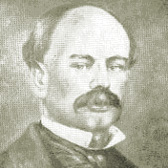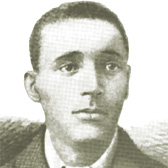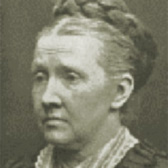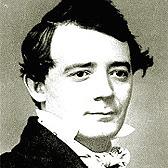Wrote "Dixie" and "The Blue Tail Fly"
Dan Emmet is best remembered today as one of the pioneers of the early Minstrel Shows with his compositions “The Blue Tail Fly”, “My Old Aunt Sally” and most notably, “Dixie”. His own company was instrumental in establishing many of the early minstrel routines and rituals, including the traditional costume of blue, swallow tailcoat, striped calico shirt, and the white pantaloons. A large group of minstrel show competitors were formed due to the great success of his shows.
Daniel Decatur Emmett was born on October 29, 1815 in Mount Vernon, Ohio and learned to play the violin, as a young boy. At the age of 15, he first performed his composition “Old Dan Tucker” during a Fourth of July celebration on the village green in Mount Vernon. He worked in his father's blacksmith shop and at 17 enlisted in the Army. He was discharged on July 8, 1835 after the Army learned he had falsified his age to enlist. He left home soon after to join the Spalding and Rogers circus as a drummer. It was with the circus that Emmett learned the technique of Negro impersonation and shortly thereafter, he got a job with the Thomas "Daddy" Rice minstrel troupe, in which he played the banjo, and also sang.
In 1842, Emmett formed his own Virginia Minstrels Troupe, making their debut in New York City's at the Bowery Amphitheater on February 6, 1843. In the year of 1844, "Old Dan Tucker" and "My Old Aunt Sally" were introduced in the Virginia Minstrels troupe. The troupe traveled to England meeting very little success and arrived back in the States, penniless. The troupe broke up and Emmett got a job with the Dan Bryant Minstrels. Emmett married Catherine Rives in 1853 in New York. The couple had no children and Catherine died in 1875. IN 1879, he would remarry Mary Louise Bird, a widow with two daughters.
Introduced by the Dan Bryant Minstrels in 1859 during a tour of the South, “Dixie” was written as a walk-around. Much to the chagrin of Emmett who was anything but a Southern sympathizer, the song became identified as a Southern anthem and was used as a campaign song against Abraham Lincoln’s run for President and was played by General Pickett during the Confederate charge at Gettysburg. After the South surrendered to the Union, President Lincoln had the song played by the White House band in an effort to support the reunification of the United States. Emmett never capitalized on the popularity of the song after selling all rights to the publisher for $500.00.
Other songs produced in the pre-Civil War era were "The Boatman's Dance," "Jordan Is a Hard Road to Travel," "The Blue-Tail Fly" (a.k.a. “Jimmy Crack Corn") and “Dixie.”
In 1878, Emmett entered semi-retirement and moved back to his hometown of Mount Vernon. He became a chicken farmer and lived of a small pension from the Actors Fund. He occasionally appeared in guest stage appearances and at the age of 80, in 1895, he appeared with the Al G. Fields Minstrels to perform “Dixie”. The appearance was Emmett’s last tour.
Dan Emmett died on June 28, 1904 in Mount Vernon. In 1943, Paramount Pictures released a film biography of his life starring Bing Crosby, entitled Dixie. The Dan Emmett birthplace is an historic landmark located off South Main Street in Mount Vernon. Established in 1987, the Dan Emmett Music & Arts Festival is held in Mount Vernon as a celebration of American music commemorating Dan Emmett.
Daniel Decatur Emmett Song List:
BLUE TAIL FLY, THE
BOATMAN’S DANCE, THE
DIXIE
HIGH DADDY
Jimmie Crack Corn (see BLUE TAIL FLY, THE)
JORDAN IS A HARD ROAD TO TRAVEL
MY OLD AUNT SALLY
OLD DAN TUCKER
OLD ZIP COON
TURKEY IN THE STRAW





